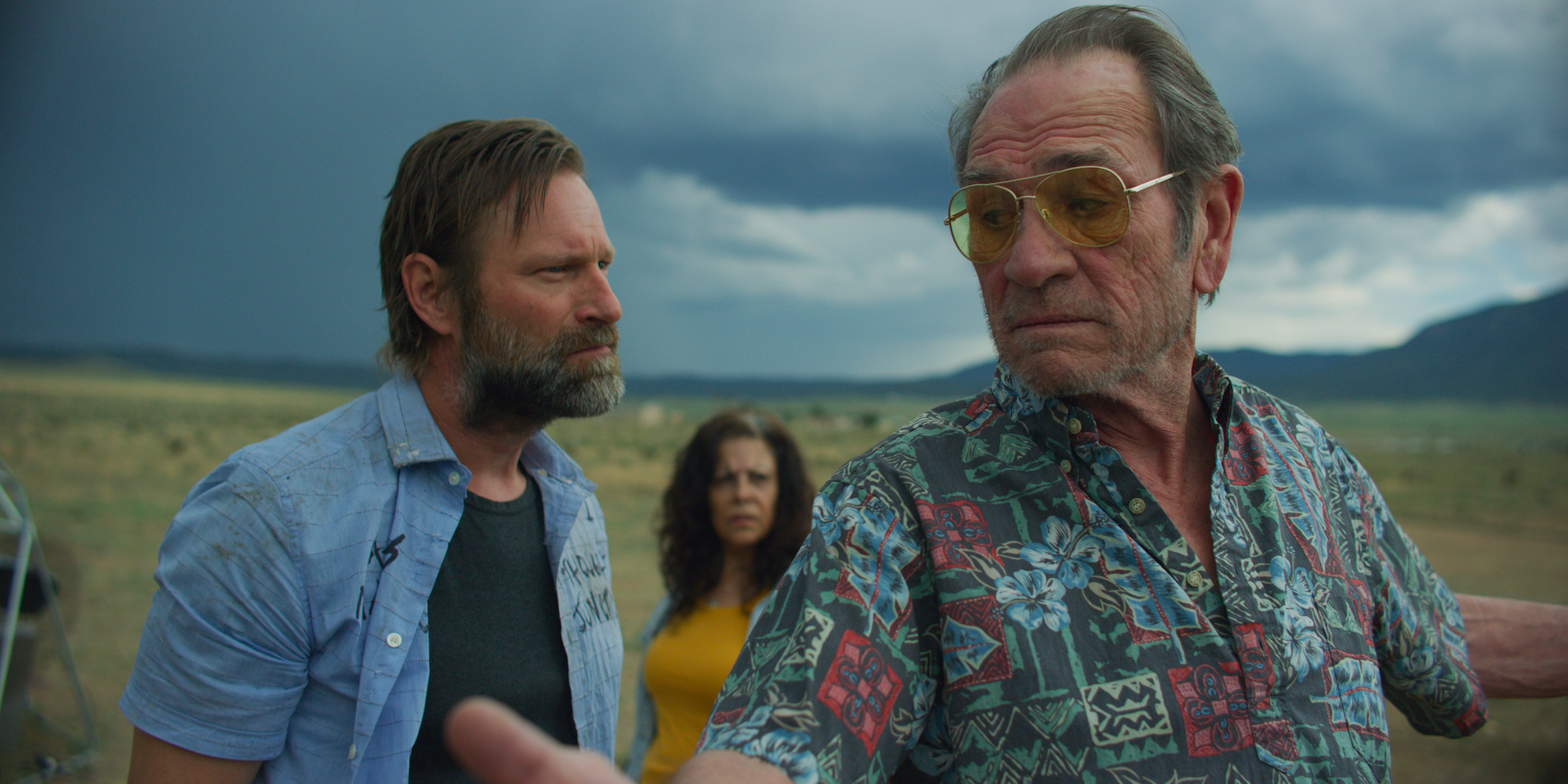What to Watch Verdict
Director April Mullen and screenwriter Tim Doiron rehash paranoid scenarios with too much style and not enough emotional substance in this unimaginative thriller.
Pros
- +
🧶 For better or worse, Eckhart acts like there's no one restraining him, delivering a truly unhinged performance.
Cons
- -
🧶 Mullen's hodgepodge of visual flourishes only complicate the path Eckhart is on rather than clearing a path to the truth.
- -
🧶 In casting Eckhart and Jones as podcast co-hosts, the filmmakers missed a real opportunity to title it 'The Two Two Faces.'
Conspiracy theories are by nature more elaborate and complex than necessary, but the mental gymnastics required to come up with the plot for Wander operate on a level that not even its protagonist could keep up with. The story of a private investigator who discovers a connection between a young woman’s death and the car accident that kills his own daughter, April Mullen’s film earns points for the sheer number of complications thrown into the path of the character played by Aaron Eckhart, but connecting the dots between them may not add up to a complete (much less satisfying) picture. Eckhart leads an impressive cast that includes a perpetually-concerned Heather Graham and Tommy Lee Jones as a podcaster cosplaying as Hunter S. Thompson, but a meandering and overcomplicated script written by Tim Doiron (Dead Before Dawn 3D) gives them too little to do in a journey that should at least illuminate some truths about themselves, even if what’s going on in the world they inhabit is never entirely clear.
Eckhart plays Arthur Bretnik, a former detective who moonlights as a private investigator when he’s not recording podcasts about conspiracy theories with his pal Jimmy (Jones). Still ailing after the death of his daughter and incapacitation of his wife Tanya (Nicole Steinwedell) from an automobile accident, he lives in an airstream trailer and lives off the grid as aggressively as possible, using a signal scrambler during telephone calls and constantly checking for cameras he’s convinced are watching him. When a woman offers him $10,000 to investigate the death of her daughter, Arthur agrees to visit their sleepy hometown of Wander and search for clues. But after circumstances of the victim’s death sync up with details from a case he was investigating at the time of his automobile accident, a growing trail of clues leads Arthur to believe that these two events are somehow linked to a larger conspiracy, and he’s the only one who can expose the truth behind it.
As his friend Shelley (Graham) worriedly monitors his behavior from afar, Arthur digs deeper into a chain of events that connects vagrants and loners from nearby towns who seem to keep disappearing, and the local authorities in Wander that are none too pleased to discover they’re being monitored. Soon, past and present collide as he struggles with reality he uncovers and the fictions he desperately wants to be true, and Arthur must make a choice whether or not to continue his investigation even if its conclusions may arrive at the cost of his sanity.
Doiron’s script contains so many different tropes jumbled together it feels like the mystery equivalent of those cryptic pseudonyms Brad Pitt rattles off in Ocean’s Eleven to describe confidence games: it’s a Tex-Mex noir with an unreliable narrator, a conspiracy theorist who learns that his conspiracy is right, an investigator who has to retrace his own steps almost as often as his subject’s, and underneath it all, one man with the truth who no one believes. To call simplistic the film’s depiction of mental illness — what he really seems to suffer from most specifically is PTSD —would be an understatement. But the bigger problem is that Doiron and Mullen really only want to use it as window dressing for visual and narrative misdirection, revealing nothing new, unique or meaningful about a character that retreats into self-generated realities in order to compensate for an unimaginable loss that he will never get past.
Like this fall’s Utopia, Wander runs a dangerous risk of validating the conspiracy theory mindset at a time when there are more unconfirmed theories circulating at preposterously high levels of mainstream visibility than ever before — or at least it would if the conspiracy that actually turns out to be true makes any sense whatsoever, or was even just expressing a specific point of view of its own. Arthur’s investigation essentially exposes an ambitious tech giant who has been conducting experiments in a pretty tiny basement lair where subjects are injected with a tracking device that records all the same information as an Apple Watch, but also for some reason explodes? The idea that state and federal organizations are developing proprietary technology to monitor citizens is not new, but even if it’s possible, it seems extremely unlikely in the way it’s being surreptitiously rolled out here. And after we learn how Arthur becomes involved not for one but two different reasons, to provide him with a sense of catharsis and also to give the powers that be a fall guy for their loose ends, these disjointed pieces connect more tenuously than ever.
As Arthur, Eckhart gives precisely the kind of mannered, off the rails performance of an actor who thinks he’s been hamstrung in mainstream fare and finally has a chance to sink his teeth into a role without restrictions, up to and possibly including a director who will say no to him. Again, there’s just too many different elements to try and keep track of in a character like this one without a sure hand either (or both) on the page or behind the camera; here, Eckhart delivers a shaggy parody of Guy Pearce in Memento, but with a script that only occasionally decides to unfold in reverse, and can’t decide when what he’s experiencing is real and when it isn’t. Meanwhile, Jones gives a livelier performance than the part deserves — Jimmy seems more like a conspiracy pragmatist than a true believer — but the most complimentary way to look at his work here is as a continuation of Johnny Vohden, the character he played in Rolling Thunder, after decades of being fed a steady diet of crackpot podcasts like the one he co-hosts with Arthur.
Heather Graham remains a compassionate and thoughtful presence on screen, but she deserves better than playing a hectoring family friend who has developed a codependent relationship with a grieving father who has developed serious, possibly irreversible mental health issues. That said, if even a part of that was the or even a real focus of the film, that would be interesting. But Mullen’s film is pretty much exactly as clever as its title, both the name of its setting and the state of mind of its hero, and everything else takes an unhappy back seat to aggressive, deliberately opaque visual style and disorienting plot complications.
The latest updates, reviews and unmissable series to watch and more!
Regardless, at this late stage in cinema’s illustrious history of conspiracies, it’s rarely what a mystery, plan or plot actually conceals that compels us to follow a character, and more about what it reveals about them as they’re investigating it — or in Arthur’s case, possibly even conceived it in the first place. In which case, if filmmakers aren’t going to use logic, then at least use a little imagination; unfortunately Wander does neither, instead beaming with pride at the puzzle its filmmakers assembled for the audience while leaving too many pieces that simply do not fit where they’ve been crammed.
Wander will be available to stream December 4th, 2020.
- The best Amazon Prime movies
- Amazon is right: You don't own your digital media
- The best shows on Amazon Prime
- New movies on Amazon Prime
Todd Gilchrist is a Los Angeles-based film critic and entertainment journalist with more than 20 years’ experience for dozens of print and online outlets, including Variety, The Hollywood Reporter, Entertainment Weekly and Fangoria. An obsessive soundtrack collector, sneaker aficionado and member of the Los Angeles Film Critics Association, Todd currently lives in Silverlake, California with his amazing wife Julie, two cats Beatrix and Biscuit, and several thousand books, vinyl records and Blu-rays.


